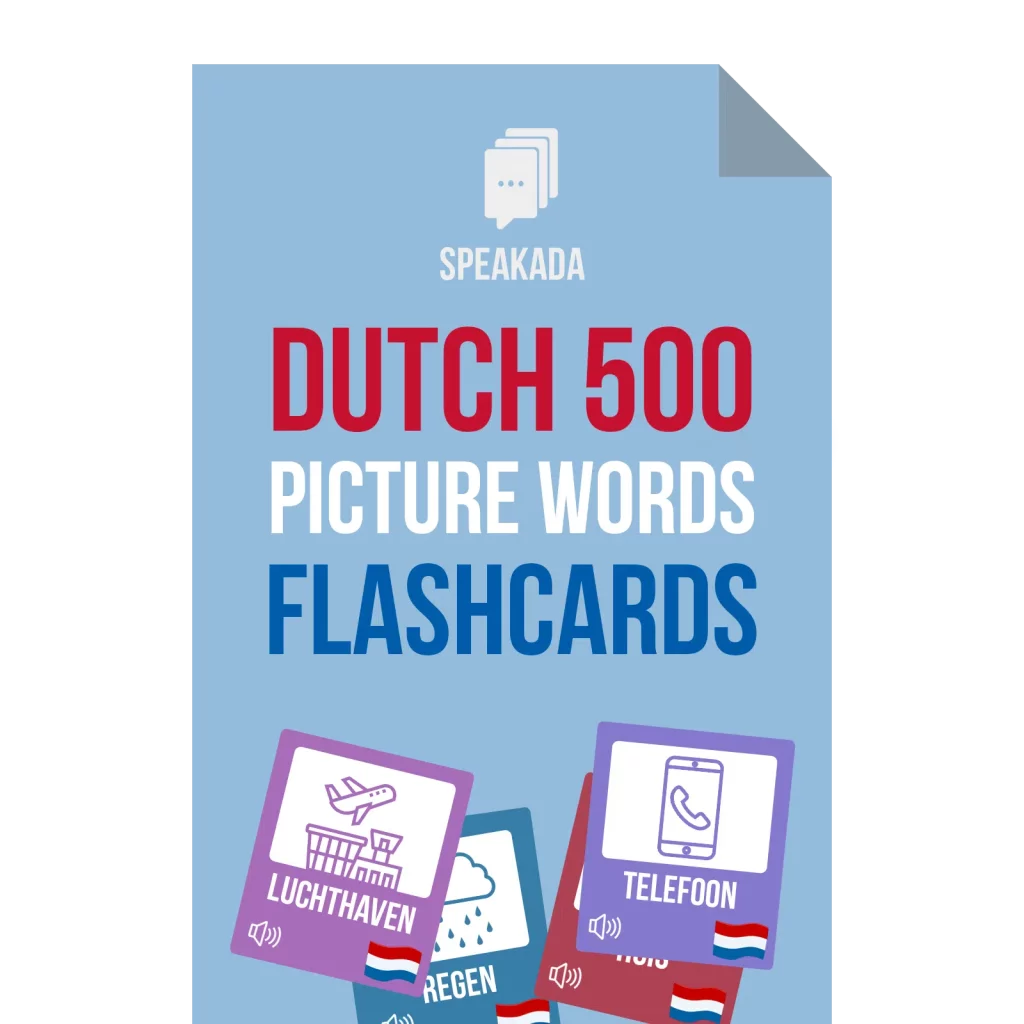How Long Does It Take to Learn Dutch Now
If you’re a Dutch language learner, and you’re at the beginner or intermediate level, you’re probably wondering, how long does it take to learn Dutch?
Some people say that it could take a few months, while others say it can take several years. So how long does it really take to learn Dutch?
It’s a good question to answer because no matter what stage you are in learning Dutch, you’ll want to be able to set realistic goals and expectations of the time and effort it actually takes to learn Dutch.
Understand the Goal of Learning Dutch
In order to answer how long it takes to learn Dutch, it’s important to first define what it really means to “learn the language” so that we can know what is the ultimate goal. From there, we can work our way backwards from that goal.
When we have clarity on what it means to actually learn the language of Dutch, then we can use this defined goal as our starting point.
Reaching a level of Dutch where you are able to comprehend and speak fluently in Dutch is where we all want to be. Essentially we want to be able to read, speak, write and listen to Dutch at a comfortable level. But how do we measure and define that level of Dutch fluency?
Many linguists and academics measure a language learner’s current level through a standardized and certified examination process governed by the Common European Framework Reference of Languages (CEFR).
If you haven’t heard of the Common European Framework Reference of Languages, it is language assessment tool that was developed in Europe, in order to rate different levels of a language. The levels start from the A levels of a beginner. Then, there’s the B levels of an intermediate to high intermediate. Finally, the CEFR includes the C levels for the proficient to more native-like levels of a language.
Linguists and experienced language learners commonly agree that the B2 level, according to the CEFR, is considered the level of fluency.
At the B2 level:
- There is a sense of minimum professional proficiency.
- When a person can speak the language with enough accuracy and flow.
- Where they have a good amount of vocabulary so that they can participate in many formal and informal conversations, get by and start enjoying the language.
Therefore for the purpose of this article, the B2 level is the goal for determining the time-frame to figure out how long it takes to learn Dutch.
Of course, once you reach the B2 level, it doesn’t mean that you are totally proficient in Dutch and have mastered it. The B2 fluency level is just another milestone in the journey of learning Dutch. But, the B2 level is the best goal to aim for and to use for the purposes of answering how long it will take to learn Dutch.
Calculating How Long It Takes to Learn Dutch
Now there are two main ways to determine a timeframe for how long it’ll take you to learn Dutch. The first is the Foreign Service Institute’s time estimates for learning Dutch. The second way is to examine the word vocabulary estimates for learning Dutch according to the B2 level.
Before we get into describing and explaining these two measures, it’s important to note that these measures give just an estimate of the time it takes to learn Dutch. The measures are based on research, and the results depended on the specific participants and learners involved.
But your case is going to be unique because at the end of the day, how long it takes for you to learn Dutch will depend on a range of personal factors. These factors include your own availability of time, and your aptitude to learn, your motivations, your skills, your experience learning other languages in the past, how relevant and connected the Dutch language is to your native language, and more. But assuming you are a native English speaker, then the following time estimates will be more relevant to you.
Foreign Service Institute Time Estimates
Firstly, let’s go through the Foreign Service Institute (FSI) estimates for the time to learn Dutch. The Foreign Service Institute is part of the US government and it’s the institute that helps teach foreign languages to American diplomats and employees involved in the Foreign Service of the United States. Their aim really is to help American government employees learn languages to represent America and professionally work around the globe. Therefore it’s important to be able to learn specific languages fast and well. So FSI offer a number of courses to their foreign service.
The Foreign Service Institute has conducted a number of studies and research related to language learning. One of their most popular studies examines how long it takes to learn different languages in order to reach the minimum professional proficiency, which in our case would be around the B2 level.
The Foreign Service Institute (FSI) estimated time ranges for various languages and levels depending on the difficulty of the language. Based on these FSI time estimates, level one languages are the easiest to learn for native English speakers, while level four languages are the hardest to learn.
The more difficult languages include Chinese, Japanese Arabic, because these are drastically different from the English language and therefore will naturally take more time to learn.
For Dutch, it is a language that is from the Romance family of languages, which has roots in Latin. So Dutch has a similar language family and roots as the English language. This means that English and Dutch have a lot of similar structures, alphabet, letters, sounds, and etymology or words.
As a result, there are many cognates, or similar-sounding words and similarly-spelled words, between English and Dutch. Therefore, this makes it much easier for native English speakers to learn Dutch as compared to learning the more difficult languages like Chinese and Japanese.
According to the Foreign Service Institute, the Dutch language is placed at a level one difficulty. Level one FSI languages will take around 30 weeks to learn. If we assume that each month has about four weeks on average and then we divide the 30 weeks into four weeks per month, that means it will take around seven and a half months at least to reach the B2 level according to FSI.
This is a good starting point to determine how long it takes to learn Dutch. But it’s not clear enough.
We need to go deeper and understand how many hours does it actually take per day, out of those 24 weeks to actually learn Dutch? Is it really practical for us?
FSI actually refers to those 24 weeks as being around 600 to a maximum 750 hours of classroom hours within that time to reach the B2 level of Dutch or minimum professional proficiency. Note that there are likely to be even more hours of study on top of classroom hours.
If you want to reach this level within the FSI suggestion of 24 weeks, how many hours does that actually mean per day?
Now if we look at the fact that, each week has seven days and if we times 24 weeks by seven days, that gives us 168 days. Then if we do divide the 750 hours by the 168 days, you should be studying approximately 4 hours and 46 minutes per day within those seven and a half months in order to reach the B2 level.
This is useful if you actually have at least 4 hours and 46 minutes per day for 168 days to study Dutch. But if you only have one hour per day available then it will take you 750 days (2 years) to reach a B2 level of Dutch.
Similarly, if you just have 30 minutes a day using the FSI data and table, it should take you up to 1500 days (4 years and 1 month) to learn Dutch at the B2 level.
The Amount of Words Needed to Learn Dutch & the Time it Takes to Learn Them
Another way to figure out how much time it takes to learn Dutch is to look at the amount of words you need to learn to reach B2 level.
When we talk about a “word”, we are referring to a lemma or a word family. For example, the words “run”, “ran”, “running” and “runs” is considered one word, not as four different words. In this example “to run”, is a word family, a lemma, that groups all of those words into one and it is just considered as one word “to run”. We consider a “word” in this way because most academics and linguists refer to a word like this in their research to make it easier to analyze them.
According to research by James Milton at Swansea University, it takes about 2000 to 3000 words of Dutch in order to reach the B2 fluency level. For the purpose of this article, let’s use the higher limit of 3000 words.
Next, if you want to calculate how long it will take to learn all 3000 words, then it will depend on how many words you can learn and remember per day, and the system you use to learn and study them. Let’s say your goal is to reach 3000 words, and you want to both learn and memorize all those words.
You’ll need a reliable system to learn new words per day while remembering old words you learned previously. We suggest that you use a spaced repetition system such as the Anki flashcards software, because it will help you manage your learning and memorization
Anki is a Spaced Repetition software that allows language learners to learn and memorize pronunciation, vocabulary and grammar using digital flashcards. It uses a Spaced Repetition algorithm to determine when you need to review certain flashcards. By doing so, you are able to retain everything you learn over longer periods of time. Anki automatically schedules your card reviews everyday, so you never have to worry about managing your card reviews.
You can also set the amount of new words you want to learn everyday. This will depend on the amount of time you have to study your cards. Ultimately, this will affect the total time it will take for you to learn Dutch.
If you learn 1 new Dutch word a day, it would take you about 3000 days or 8 years to learn Dutch. This would take too long and you’ll certainly lose momentum very quickly. If you learn 1 new Dutch word a day, it would take you about 3000 days or 8 years to learn Dutch. This would take too long and you’ll certainly lose momentum very quickly.
On the other hand, if you learn 10 words a day, then it’ll take you 300 days or about 10 months in order to be able to learn the vocab needed to reach the B2 level. Similarly, if you learn 20 words a day, then it will take you about five months to learn the vocab necessary for the B2 level.
Remember that you’re still going to have to learn grammar and other aspects of the language. So these vocabulary-based time estimates are certainly just a guide. However, these time calculations are still a great way to give you a better understanding about the time it will take to learn the vocabulary necessary to reach the Dutch B2 level.
The Bottom Line for How Long it Takes to Learn Dutch
In conclusion, it is going to take some time and effort to learn Dutch regardless of the method you use to figure out how long does it take to learn Dutch. The more available hours that you personally have per day will certainly boost and speed up the process of learning Dutch. But when we look at the FSI estimates and the vocabulary word estimates to reach the B2 Dutch level, it looks like it will take a couple of months to maybe even a few years to reach Dutch at a fluent level.
You May Also Like
More Anki Dutch Articles

Best Dutch Anki Decks 2024 That You Need Now

How to Learn Dutch Vocabulary

How to Use Anki for Dutch

Mastering Dutch Made Easy: Step-By-Step Guide for How to Learn Dutch Now

How Long Does It Take to Learn Dutch Now












